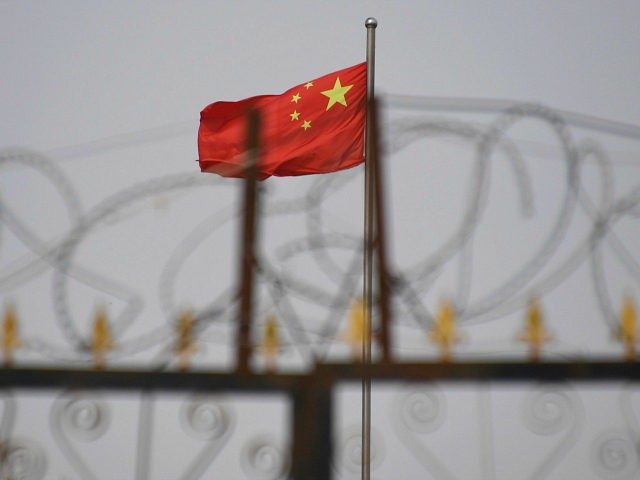The Chinese Communist Party previewed the upcoming broadcast of the latest installment in its propaganda series defending the genocide of the Uyghur people in Xinjiang on Friday with a column in the Global Times explaining the phenomenon of “two-faced persons,” or Party officials who did not agree with the genocide.
Beijing has implemented increasingly abhorrent policies in Xinjiang, the homeland of the Uyghur minority ethnic group, since at least 2017, culminating in the construction of over 1,000 concentration camps housing millions of people. Outside of the camps, communist officials have enslaved Uyghurs in the local cotton industry, forcing them to pick cotton that has found its way into global supply chains. Reports indicate many of the children of those imprisoned and enslaved have ended up in “orphanages” around the country where they are banned from practicing the Islamic faith of their families, forced to speak the foreign Mandarin language, and indoctrinated into Han supremacist communism.
An extensive study conducted by dozens of international legal experts and published this month concluded China has engaged in every act detailed in the international legal definition of genocide against Uyghurs, Kazakhs, Kyrgyz people, and other Muslim ethnic minorities in Xinjiang.
The Global Times revealed in a preview of “Enemies Within,” an episode of a series defending these practices, that a significant obstacle to eradicating the Uyghur people and their culture was the existence of “two-faced persons” who allegedly sabotaged Communist Party efforts through allowing Uyghur schools to use Uyghur-language textbooks and other unspecified “ideological support.”
“In the past, some people took advantage of the particularity of bilingual education and distorted the history, development of Xinjiang and ethnic minorities in textbooks which poisoned local children,” the newspaper claimed, citing a regime-approved “expert,” Li Wei.
Li claimed that “two-faced persons” created unique challenges for Beijing “due to their positions and social status,” the first high-profile admission on the part of the Chinese government that its genocidal policies faced enough pushback from locals within the Party to hinder the process. These individuals were allegedly “major reasons” behind Beijing’s difficulty in imposing its communist agenda in Xinjiang.
The allegedly disloyal officials allegedly aided “some criminal groups that spread extremist ideas, incite ethnic hatred, and promote the spread of terrorism activities and extremism in Xinjiang through education,” the Global Times claimed.
“There was a period in Xinjiang when terrorist attacks had been very frequent and the major ‘black hand’ behind is ‘two-faced person.’ Some of them even hold positions of power and they on the surface agreed to maintain the security and stability of Xinjiang,” Li claimed, “but essentially in collusion with ‘three forces’ (terrorism, extremism and separatism), backed them, and notified them some messages.”
The Communist Party claims that Xinjiang prior to the genocide was home to separatist and terrorist groups creating chaos in the region, most prominently the East Turkestan Islamic Movement (ETIM). The United States removed ETIM from its list of designated Foreign Terrorist Organizations in November, citing a lack of evidence that it actually exists.
The state propaganda newspaper quoted Li as concluding “China’s anti-terrorism measures pay more attention to the protection of human rights.”
“The U.S.-led West tends to kill terrorists as soon as they find them, without taking any effective measures to save them,” Li argued, as opposed to China, which has imprisoned millions of “terrorists” in concentration camps.
“Who protects more human rights in comparison?” Li asked rhetorically.
China has for decades struggled with anti-communist and separatist sentiments in Xinjiang. Under dictator Xi Jinping, who took power in 2013, efforts against the Uyghur people have become far more systemic, now implemented through a vast “security” infrastructure that relies heavily on advanced surveillance technology. Xi appointed Chen Quanguo, a veteran of oppressive policies in Tibet, the head of the Xinjiang Communist Party in 2016, enabling him to recreate the security apparatus of Tibet in the much larger Xinjiang. Chen rapidly created nearly 100,000 new police positions, built police stations, and implemented cameras and surveillance technology in most of Xinjiang’s major cities. Under his authority, reports surfaced last year that the telecommunications company Huawei developed artificial intelligence that could identify someone as belonging to the Uyghur ethnicity by scanning their face, alerting police when a Uyghur person was out in public.
Chen also presided over the creation of the concentration camp system. At their peak, an estimated 3 million people were trapped in the camps, forced to endure extensive torture — including nightly rapes — and communist indoctrination. Some survivors have testified to being forced into slavery and tested for potential organ harvesting. Many have testified to being electrocuted.
China rapidly built dozens of orphanages to contain the children of those sent to the camps, a report revealed in 2018. Children at the camps reportedly must denounce their faith, learn Mandarin, and pledge loyalty to the Communist Party.
The Communist Party justifies the camps by referring to them as “vocational training centers” and claiming they offer educational opportunities for individuals identified as being at high risk to fall into terrorist activity. China does not specify how it identifies potential terrorists and has not answered questions regarding the internment of doctors, attorneys, and other highly educated and successful career people at the camps.

COMMENTS
Please let us know if you're having issues with commenting.